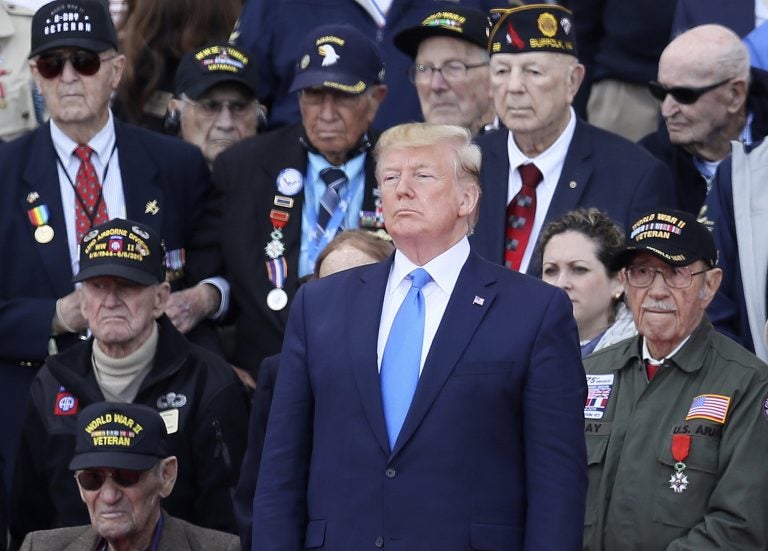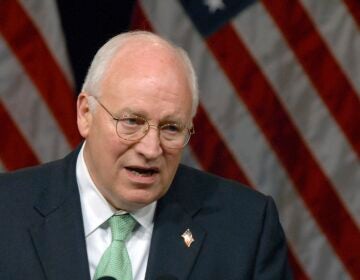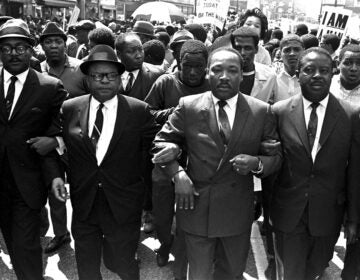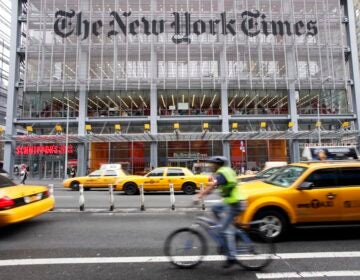D-Day at 75: Are we worthy?
Are we worthy inheritors of what the D-Day fighters bequeathed us?

U.S. President Donald Trump stands with World War II veterans during a ceremony to mark the 75th anniversary of D-Day at the Normandy American Cemetery in Colleville-sur-Mer, Normandy, France, Thursday, June 6, 2019. World leaders are gathered Thursday in France to mark the 75th anniversary of the D-Day landings. (David Vincent/AP Photo)
Seventy five years ago today, American boys barely out of their teens bled and died on Normandy beaches fighting for what Gen. Dwight Eisenhower later called “the intangibles that are the real treasures free men possess.” Ike said that, initially, these boys “were mentally unprepared for the realities of war — especially as waged by the Nazis,” but that, ultimately, they endured the unimaginable and achieved the seemingly impossible.
The fundamental lesson, Ike said in a London speech at war’s end, is that international alliances must be forged to keep the peace and protect the treasures of freedom: “No petty differences in the world of trade, traditions, or national pride should ever blind us to our identities in priceless values.”
But now, as first-hand memories of that extraordinary era flicker and die, we westerners who have most benefited from the soldiers’ supreme sacrifice seem increasingly blind. The intricate web of security and trade alliances that have kept the beasts at bay — most notably NATO, the United Nations Security Council, the World Trade Organization, and the European Union — is being rocked by spasms of nativist nationalism and knee-jerk isolationism, led by an American president who reveres autocrats and seems determined to loosen the ties that bind.
Pvt. Jack Port, a 97-year-old American survivor of D-Day, said it best yesterday in The Wall Street Journal: “I’m very disappointed, and I hate to leave the world feeling this way.”
On the 20th anniversary of D-Day in 1964, Eisenhower visited the Normandy American Cemetery, where more than 9,380 soldiers are buried, and said: “These people gave us a chance, and they bought time for us, so that we can do better than we have before.” We made the most of that chance, and, by forging those binding alliances, we indeed did better. President Reagan doubled down on that pledge 20 years later, on the 40th anniversary, when he addressed our western allies: “Your hopes are our hopes, and your destiny is our destiny.”
But now, as Donald Trump attacks the worthiness of the NATO military alliance — in the words of Nicholas Burns, George W. Bush’s ambassador to NATO, Trump “has been weak and reactive in defending NATO against its most aggressive adversary, Vladimir Putin” — we have reached an historic crossroads. Now, as Trump undermines free trade by slapping steel and aluminum tariffs on European Union countries, as he cheers a British exit from the EU, as he abdicates America’s leadership of the free world by declaring “America First,” we must urgently ask ourselves:
Are we worthy inheritors of what the D-Day fighters bequeathed us?
In the film “Saving Private Ryan” — which cemented D-Day’s place in the popular culture, at least circa 1998 — Ryan is given a chance to lead a worthy life. His dying superior officer tells him: “Earn this.” I saw the film again yesterday, at a special screening, and that closing scene hit home in a way it had not back in 1998, when our western alliances were not being undermined from within. Now we must urgently ask ourselves:
What can we do — starting at the ballot box, in what is still, hopefully, a functioning democracy — to truly earn what we have been given, thanks to those kids on those beaches who gave up everything.
By gaining a toehold on the European continent, the D-Day invasion was the first necessary thrust in the victorious fight against fascism. It never would have been necessary if America and other western nations had eschewed ’30s isolationism and worked in tandem to confront the nascent Nazi threat. That is the supreme lesson of the 20th century, and we ignore it literally at our peril.
Trump is too ignorant to know any better, so it falls to us to honor the World War II veterans — roughly 350 are dying each day — by saying no to historical amnesia. As the philosopher George Santayana famously warned, “Those who cannot remember the past are condemned to repeat it.”
WHYY is your source for fact-based, in-depth journalism and information. As a nonprofit organization, we rely on financial support from readers like you. Please give today.




